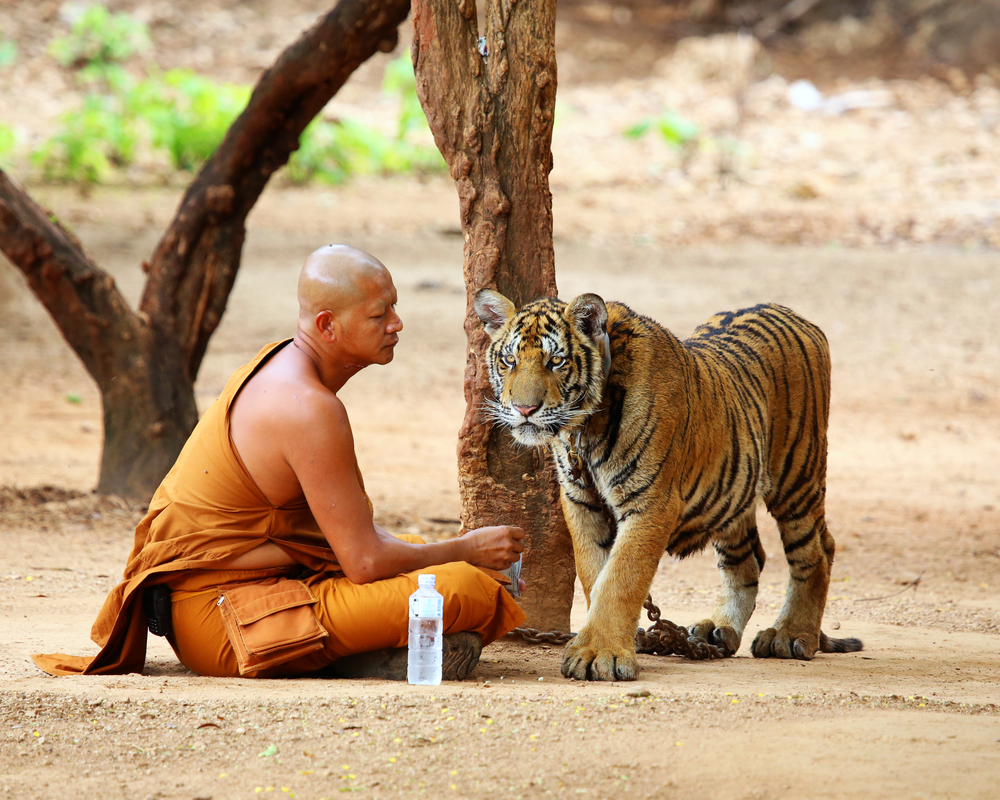
The frozen remains of 40 dead tiger cubs have been discovered by wildlife officials at a Buddhist Temple in Thailand, where a monk has also been detained and accused of smuggling animal parts. The gruesome finds came to light on Wednesday and Thursday, during the authorities’ on-going operation to remove and relocate all 137 living tigers from the complex.
Wat Pha Luang Ta Bua temple, commonly known as the ‘Tiger Temple’ is a popular tourist site in Kanchanaburi province. Thousands of visitors regularly pay 600 Thai Baht to enter the site, and more to pose next to the tigers for photos, or to pet and feed the endangered animals. According to the Wildlife Friends Foundation Thailand (WFFT), this brings the temple an annual income of around 100 million Thai Baht ($2.8m, £1.9m). In the past, travellers and wildlife organisations have accused the temple of drugging and mistreating the animals to make them subdued so they can be petted, walked and touched.

The so-called sanctuary took in its first tiger cub in 1999, and has increased its collection to almost 150 over the last decade and a half. The population is mostly comprised of Bengal tigers, with a few hybrid breeds in the mix. Other animals, including jackals, hornbills and Asian bears, have also been kept, allegedly without the required permits.

The temple has long denied persistent accusations of animal abuse, illegal breeding and trafficking. However, Thai police intercepted a monk, accompanied by two additional men, attempting to escape from the temple in a truck on Thursday, and they subsequently seized found two full-length tiger skins, 10 tiger fangs and around 700 amulets made from tiger body parts.
‘This confiscation shows that the temple is likely involved in illegal tiger trade,’ Teunchai Noochdumrong, director of of the Wildlife Conservation Office, told the BBC. ‘They are clearly violating the law in selling, distributing of transferring the protected animals or their parts.’
This week’s operation was the culmination of a battle between the temple and animal welfare organisations that has been raging since 2001. In one incident in late 2014, three adult male tigers vanished from the site, which prompted the temple’s vet, Somchai Visasmongkolchai, to resign from his post and come forward to reveal that the animals’ microchips had been cut out of them, so they could not be tracked. The vet was subsequently physically threatened by people identified as dek wat (temple boys).
Thailand’s Department of National Parks (DNP) has tried numerous times to confiscate the tigers, but until now the monks have always managed to prevent them gaining access to the temple. Last Monday, Thai authorities accompanied the WFFT and other NGOs to launch a large-scale raid. After being blocked again by the monks, a court order was raised that allowed them to force their way in.
Up to 1000 people were involved in the rescue mission, but the monks continued to frustrate the operation, with tactics that allegedly included refusing to feed the animals, and even releasing them. This made the escalating situation dangerous for the conservationists, and also resulted in the deaths of several domestic animals, as four tigers escaped and went on the rampage.

Meanwhile, a lively debate is taking place on the temple’s Facebook page, with the monks attempting to defend themselves, while others condemn their actions. According to the monks, the dead cubs’ bodies had been frozen instead of cremated, so they could ward off accusations of trafficking. They accuse the DNP of spreading lies and propaganda, and have release footage of injured animals in DNP care.
However, the temple’s ‘Foreign Department’ who run their social media, have denied previous knowledge of the tiger skins and necklaces, and now say they are ‘disgusted at this discovery’ and are ‘looking forward to the authorities bringing the culprits to justice’.
Stung by some of the personal accusations that have been flying around, many former and current volunteers have joined the conversation. One particularly impassioned post by volunteer Mia Hunter, who admits the sanctuary was ‘imperfect’ and that she has growing frustrations with the way it was managed, reads:
‘What is it you people want to hear? That we (staff and volunteers) have been enjoying watching and participating in tiger abuse for years? That we have been getting rich from selling tiger bones/skins/etc. to people? So rich that we give up our jobs for this new found career? That we have been getting up at 6am every morning after sleeping in a mosquito infested forest hovel we are provided with to go and administer drugs to 140-ish tigers every day for months on end? And that in our spare time, we head deep into the forest to skin tigers, make trinkets from their bones and concoct tiger wine from the still born babies? And that we thrive on all this so much that we defend this place to the end? WAKE UP!’
It’s believed that, once they are all rounded up, the tigers will be transferred to two governmental breeding centres in Thailand’s Ratchaburi Province. ‘The fact that they are hand-raised tigers means they have very little fear of humans or wildlife instincts,’ Tom Taylor, assistant director of the WFFT, told the BBC. ‘At the moment, the plan is to provide them with wildlife care.’

